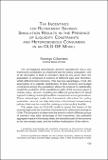Artículo
Tax incentives for retirement savings: simulation results in the presence of liquidity constraints and heterogeneous consumers in an OLG-GE model
Date
2005Abstract
The overlapping generations general equilibrium (OLG-GE) framework constitutes an important tool for policy evaluation. One of its strengths is that it considers that at any given time the population is composed of workers of different ages and, therefore, whith different time horizons. This has two advantages. First, the assumption of a realistic distribution of time horizons and budget constraints among the population allows the analyst to realistically model the evolution of the equilibrium path of the economy given a certain policy. Second, modeling the different generations in detail supports making meaningful welfare comparisons across generations. These advantages make the framework attractive for policy evaluation, since it can help determine cohort-based compensatory policies that may be crucial for making a certain policy feasible.
Collections
View/


